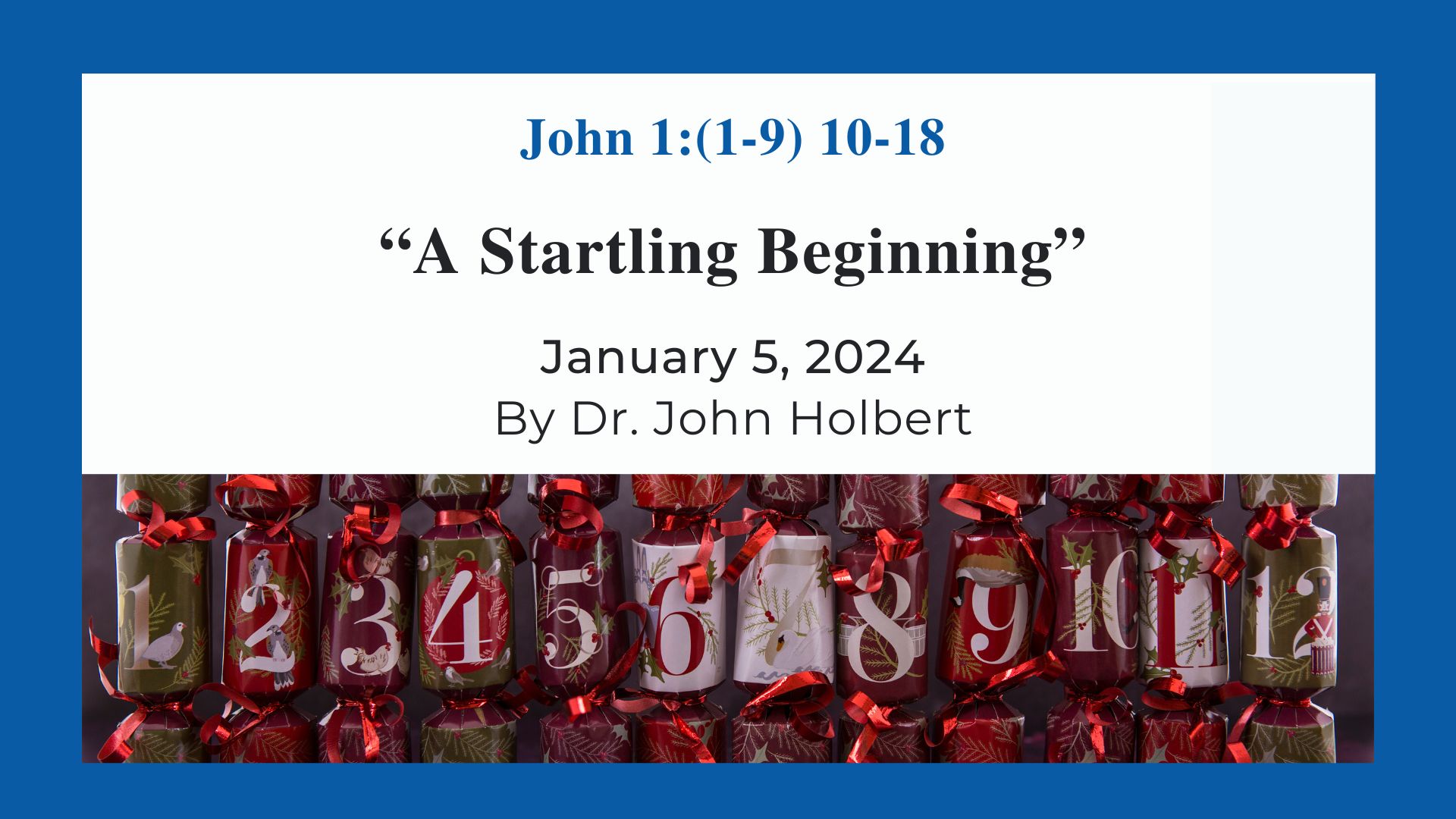A Startling Beginning - Reflections on John 1: (1-9), 10-18, Christmas 2, Year C
by John Holbert on Tuesday, December 3, 2024

I must begin my essay today with a frank admission: I have long found the Gospel of John very troubling. I am one who finds the stark language of Mark’s Gospel, its paucity of parables, its hurtling narrative action, its astonishing and perplexing ending much to my liking. I can readily imagine the tale as told by Mark fixing his hearers in rapt attention as the teller uncoils the story with vivid alacrity. John lives in a completely different world, one characterized by philosophy and reflection, careful language and grammatical nuance. Little wonder that my friends who are scholars of Greek resonate with this Gospel, relish its subtleties, delight in its refined diction. I can appreciate such finery, but my instincts lie elsewhere.
Still, even I find rich and imaginative beauty in the famous prologue to John’s Gospel, the subject of today’s lection. What serious Christian does not know some of the sweeping phrases found here: “In the beginning was the Word;” “the Word became flesh and dwelt among us, and we have seen his glory;” no one has ever seen God; the only son, close to the father’s bosom, has made God known.” Each of these phrases, so dear to the lives of many Christians, is replete with linguistic, grammatical, hence theological shadings, far too many to discuss in one short article. I must perhaps choose a phrase or two to discuss at more length to help any preacher who wishes to take on this deep mine of ideas that John has dug for us. I would like to focus on the first five verses of the passage, what might be named “the Word in (of) God becomes the light of the world.”
“In the beginning was the Word, and the Word was turned toward God; what God was the Word was.” The Greek proposition pros may here possess a sense of “motion toward,” that is the preexistent Word moves toward God in special intimacy. The next phrase I have translated as “what God was the Word was” renders the Greek kai theos en ho logos, placing the complement “God” before the verb “to be”, and following it with the subject with an article. This has the effect of keeping a distinction between Word and God while maintaining an intimacy between them; “as God is divine so the Word is divine,” as Francis Molony says in his commentary (1998).
It is of course obvious that John’s beginning is an echo of Genesis 1:1, whose Greek version is identical, en arche. In Genesis prior to that arche, there was only God, the chaotic waters, and the darkness, but in John there is this preexistent Word, a Word that exists before any human story, but that exists in some sort of relationship to God. This Word resembles that preexistent Sophia in Proverbs 8, God’s companion in creation. Rather like the Proverbs figure, the Word in John is directly involved in the creation of God. In fact, “all things were made through him, and without him nothing was made.” Furthermore, “in him was light and the light was the light of humanity.” This light appears in the darkness of the world, “shines in the darkness, but the darkness has not overcome it.” Here we see the intimation of the incarnation of the Word that is so central to John’s theology. The Word becomes light for humanity, and though the darkness persists, so too does the light; it continues to shine even now.
C.K Barrett makes clear the vast importance of this beginning of John’s Gospel: “John intends that the whole of his gospel shall be read in light of this verse. The deeds and words of Jesus are the deeds and works of God; if this be not true the book is blasphemous” (Barrett, 1972). And John goes on to say that the Word becomes enfleshed in Jesus Messiah, and as such, “we have gazed at his glory, glory as of the only son of the Father” (John 1:14). It could be said that the identity of Jesus is revealed to us with clarity and power in this prologue to the Gospel. In fact, the game is over in the top half of the first inning! Whenever we encounter Jesus in John’s narrative, we are looking squarely at God, the very incarnation of divinity among us. The other three gospels of course share this conviction that Jesus is uniquely related to God, but only in John is it made plain that seeing Jesus is at the same time seeing God. How else explain the mighty signs that the man Jesus will perform in John’s telling? It is God in the flesh acting on earth.
I do not wish to suggest that John has disappointed me by his approach to the story of Jesus; it is surely a powerful one, and one that has energized countless millions of readers and hearers over two millennia. Still, I prefer Mark whose rich ironies and clever use of multiple stories, coupled with that remarkable and unforgettable ending, matches my desire for mystery and surprise more than John wishes to provide. To each his or her own! Yet, John has written words that shall never be forgotten and provided countless readers a delightful and plentiful buffet of linguistic and theological profundities that have stood and will stand the test of Christian time. Jesus as living Word, living light, “full of grace and truth,” are all metaphors that can carry us to a fuller relationship to this Jesus, the only son of the Father.
